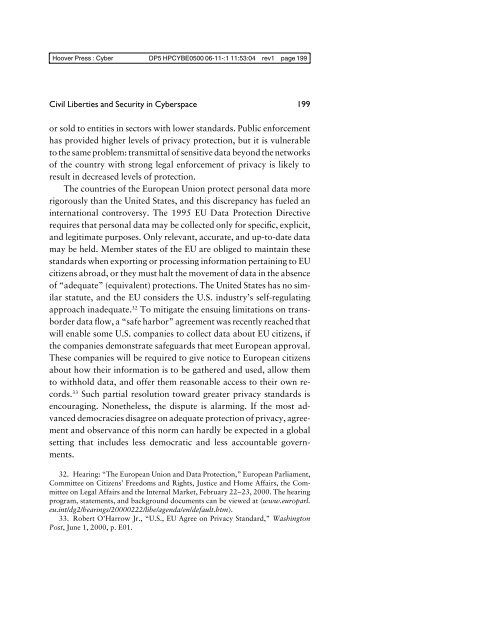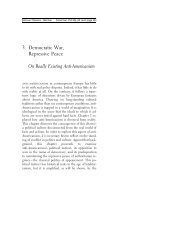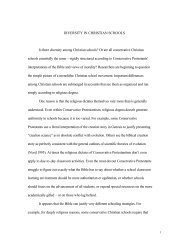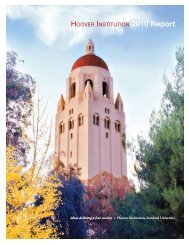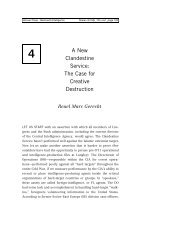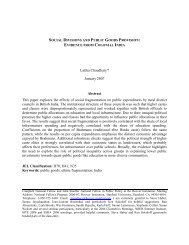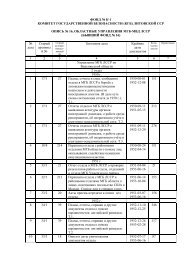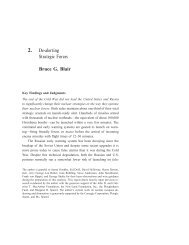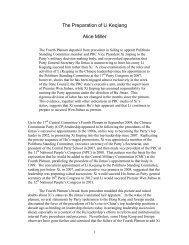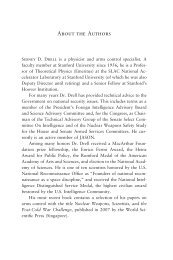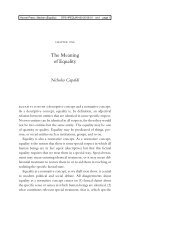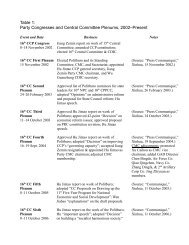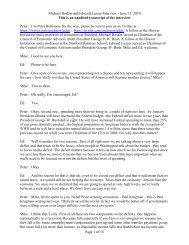Civil Liberties and Security in Cyberspace - Hoover Institution
Civil Liberties and Security in Cyberspace - Hoover Institution
Civil Liberties and Security in Cyberspace - Hoover Institution
Create successful ePaper yourself
Turn your PDF publications into a flip-book with our unique Google optimized e-Paper software.
<strong>Hoover</strong> Press : Cyber DP5 HPCYBE0500 06-11-:1 11:53:04 rev1 page 199<br />
<strong>Civil</strong> <strong>Liberties</strong> <strong>and</strong> <strong>Security</strong> <strong>in</strong> <strong>Cyberspace</strong><br />
199<br />
or sold to entities <strong>in</strong> sectors with lower st<strong>and</strong>ards. Public enforcement<br />
has provided higher levels of privacy protection, but it is vulnerable<br />
to the same problem: transmittal of sensitive data beyond the networks<br />
of the country with strong legal enforcement of privacy is likely to<br />
result <strong>in</strong> decreased levels of protection.<br />
The countries of the European Union protect personal data more<br />
rigorously than the United States, <strong>and</strong> this discrepancy has fueled an<br />
<strong>in</strong>ternational controversy. The 1995 EU Data Protection Directive<br />
requires that personal data may be collected only for specific, explicit,<br />
<strong>and</strong> legitimate purposes. Only relevant, accurate, <strong>and</strong> up-to-date data<br />
may be held. Member states of the EU are obliged to ma<strong>in</strong>ta<strong>in</strong> these<br />
st<strong>and</strong>ards when export<strong>in</strong>g or process<strong>in</strong>g <strong>in</strong>formation perta<strong>in</strong><strong>in</strong>g to EU<br />
citizens abroad, or they must halt the movement of data <strong>in</strong> the absence<br />
of “adequate” (equivalent) protections. The United States has no similar<br />
statute, <strong>and</strong> the EU considers the U.S. <strong>in</strong>dustry’s self-regulat<strong>in</strong>g<br />
approach <strong>in</strong>adequate. 32 To mitigate the ensu<strong>in</strong>g limitations on transborder<br />
data flow, a “safe harbor” agreement was recently reached that<br />
will enable some U.S. companies to collect data about EU citizens, if<br />
the companies demonstrate safeguards that meet European approval.<br />
These companies will be required to give notice to European citizens<br />
about how their <strong>in</strong>formation is to be gathered <strong>and</strong> used, allow them<br />
to withhold data, <strong>and</strong> offer them reasonable access to their own records.<br />
33 Such partial resolution toward greater privacy st<strong>and</strong>ards is<br />
encourag<strong>in</strong>g. Nonetheless, the dispute is alarm<strong>in</strong>g. If the most advanced<br />
democracies disagree on adequate protection of privacy, agreement<br />
<strong>and</strong> observance of this norm can hardly be expected <strong>in</strong> a global<br />
sett<strong>in</strong>g that <strong>in</strong>cludes less democratic <strong>and</strong> less accountable governments.<br />
32. Hear<strong>in</strong>g: “The European Union <strong>and</strong> Data Protection,” European Parliament,<br />
Committee on Citizens’ Freedoms <strong>and</strong> Rights, Justice <strong>and</strong> Home Affairs, the Committee<br />
on Legal Affairs <strong>and</strong> the Internal Market, February 22–23, 2000. The hear<strong>in</strong>g<br />
program, statements, <strong>and</strong> background documents can be viewed at www.europarl.<br />
eu.<strong>in</strong>t/dg2/hear<strong>in</strong>gs/20000222/libe/agenda/en/default.htm.<br />
33. Robert O’Harrow Jr., “U.S., EU Agree on Privacy St<strong>and</strong>ard,” Wash<strong>in</strong>gton<br />
Post, June 1, 2000, p. E01.


